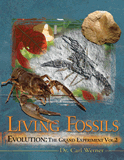Jigsaw Puzzle Challenge
ScienceDaily: “Study Pits Man Versus Machine in Piecing Together 425-Million-Year-Old Jigsaw” Reassembling half-billion-year-old fossils from bone fragments: a task so complicated that only computers can handle it?
Researchers from the University of Leicester and Canada’s Royal Ontario Museum report in the journal Palaeontology an interesting “competition” they held: do humans or computers do a better job reassembling fragmented old fossils?
Computers were more consistent than human researchers.
The scientists looked at how well paleontological “experts” were able to rebuild conodont fossils compared to the results of computer-based statistical methods. Conodonts were eel-like creatures thought by evolutionists to have lived hundreds of millions of years ago. Their many teeth, often scattered throughout marine rocks, complicate the process of reconstructing their skeletons. Another difficulty is that scientists have no living examples of conodonts on which to based their reconstructions. These factors make reassembling conodont fossils the equivalent of putting together jigsaw puzzles without any picture as a guide. University of Leicester researcher Mark Purnell, one of the study leaders, explained the difficulty:
“When a vertebrate animal dies, whether it’s a fish, a sabre-tooth cat or a dinosaur, the flesh rots away and the bones of the skeleton are usually scattered before being fossilised. In order to interpret them correctly, the palaeontologist must piece them back together, or at least work out which bits are which.
“To make matters worse, within any one [conodont], teeth from different parts of the skeleton looked almost identical! Now we have a jigsaw puzzle with no picture, where each piece could go in different places. But just so it’s not too easy, conodont teeth are also microscopic.”
What was the result of the friendly “competition”? The most reliable reconstructions were produced not by computers, but instead by expert paleontologists. However, computers were more consistent than human researchers; less experienced paleontologists were prone to mistakes, and even the expert paleontologists had their own disagreements.
Our point is not to emphasize the value of either human- or computer-led research; obviously each has its place. Instead, this story reminded us of the difficulty in piecing together any poorly preserved or scattered fossil, especially when (as the scientists indicate) we have no living representatives to serve as a “guide.” When the fossils are incomplete, how can anyone—human or computer—know a reconstruction is accurate? Further troubling is the role evolutionary dogma plays in telling paleontologists how a fossil “should” look if it is assumed to be a transitional form.
For these reasons, this research reminds us of the caution we should accord to every fossil reconstruction. Especially when it comes to supposed “ape-men” like Lucy, Ardi, and others, we must be aware of the fact that evolutionary ideas may be (consciously or subconsciously) guiding the reconstruction, giving scientists a false sense of certainty. Even statistical techniques, when it comes to organisms that have no living representatives, may include tacit evolutionary ideas.
For more information:
Remember, if you see a news story that might merit some attention, let us know about it! (Note: if the story originates from the Associated Press, Fox News, MSNBC, the New York Times, or another major national media outlet, we will most likely have already heard about it.) And thanks to all of our readers who have submitted great news tips to us.
(Please note that links will take you directly to the source. Answers in Genesis is not responsible for content on the websites to which we refer. For more information, please see our Privacy Policy.)
Recommended Resources

Answers in Genesis is an apologetics ministry, dedicated to helping Christians defend their faith and proclaim the good news of Jesus Christ.
- Customer Service 800.778.3390
- © 2024 Answers in Genesis








